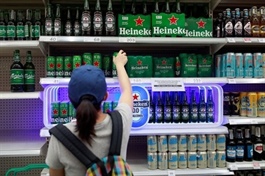Balancing interests for fair hike to special consumption tax
Balancing interests for fair hike to special consumption tax
The roadmap laid out to increase Vietnam's special consumption tax (SCT) should be scrutinised to balance the interests of the government, manufacturers, and consumers.

This message was conveyed by Nguyen Thi Cuc, chairwoman of the Vietnam Tax Consultants’ Association, at the conference themed ‘Tax Amendments to Promote Business Activities’ hosted by VIR on August 14.
According to Cuc, SCT differs from other taxes due to its regulatory scope, necessitating a balance between state interests, businesses, and consumers. Thus, policies for this tax must align with all parties' objectives.
“We agree with increasing the tax rate on alcohol from 2026 to 2030 to raise prices, limit consumption, and ensure public health. However, the drafting committee needs to provide calculations based on market research and consumer demand, and harmonise tax rates for different products with specific quantification,” said Cuc.
With the aim of limiting consumption by consumers and increasing state budget revenue, the current policy is to increase product prices. However, Cuc pointed out that an unreasonable tax hike could lead consumers to shift to non-official or smuggled goods, which would eat into state revenue.
“A sudden tax increase will not only affect manufacturers but also the entire food and beverages (F&B) chain. Therefore, a reasonable roadmap is necessary. We recommend extending the timeline to give the F&B chain time to prepare for gradual increases,” Cuc proposed.
For alcoholic beverages such as beer and liquor, the Ministry of Finance (MoF) is currently considering two options for increasing the SCT. The first option proposes increasing the tax rate for alcohol of 20 per cent and above and beer from 65 to 70 per cent by 2026, with a 5 per cent annual increase to reach 90 per cent by 2030. The second option suggests an immediate increase to 80 per cent in 2026, with a 5 per cent annual increase to reach 100 per cent by 2030.
“This tax increase timeline is too short. I believe it needs to be extended to allow manufacturers and the supply chain time to prepare to avoid shocks from rapid increases. We agree on raising taxes, but a reasonable roadmap is needed,” said Cuc.
The Vietnam Tax Consultants’ Association representative recommended the first option of the draft law but suggested extending the time for adjusting the 5 per cent tax rate increase from annually to at least every two years.
Regarding the tax calculation method, Cuc shared, “The drafting committee has chosen the relative method for calculating tax. Given the current conditions of Vietnam's alcohol industry, I support using the relative method for these products. The mixed method may be implemented in the future according to the roadmap.”
“We expect that calculating and determining a reasonable excise duty policy in this amendment of the Tax Law will aim towards better harmonising the goals of protecting public health, stabilising production and business, ensuring employment for workers, and contributing revenue to the state budget,” she added.
























